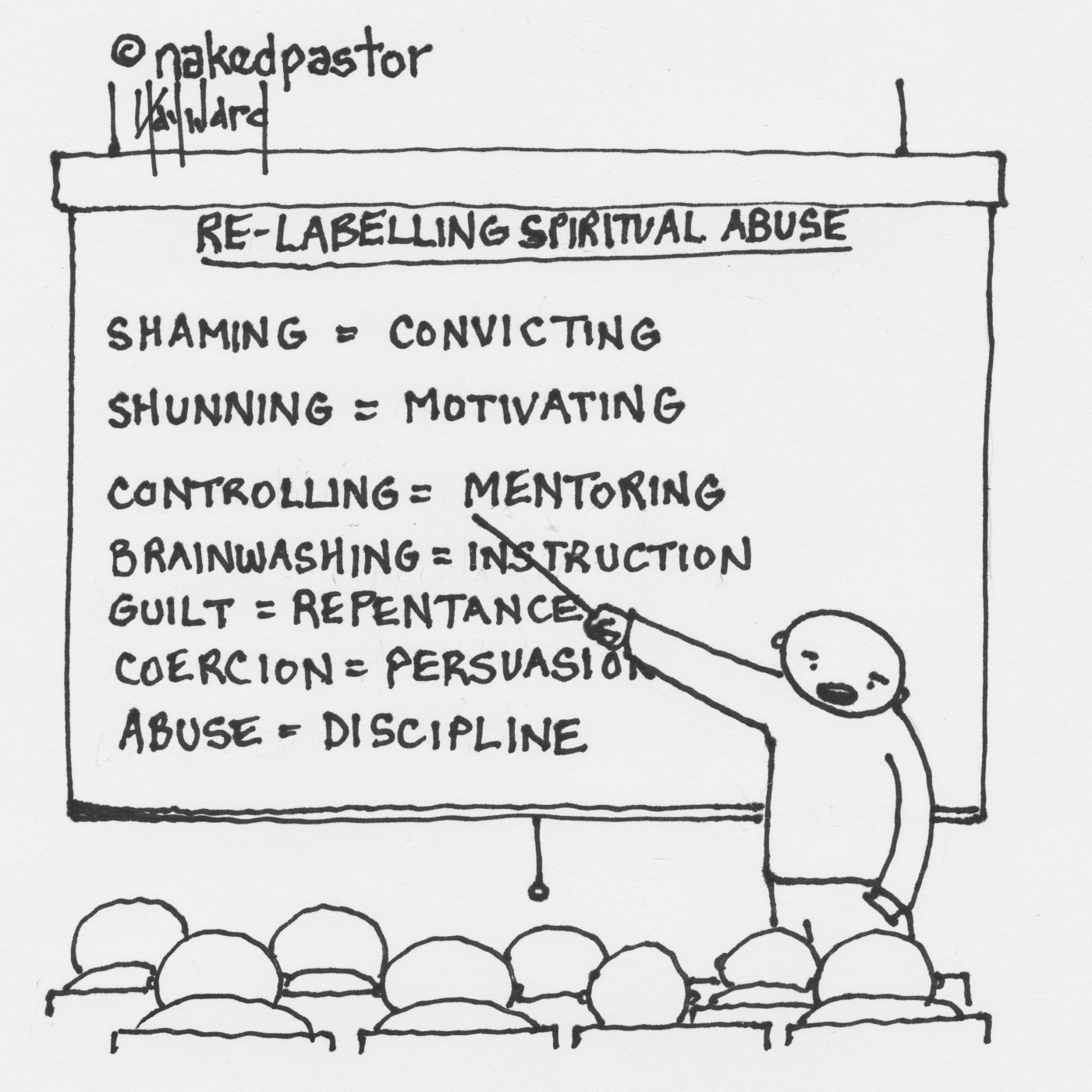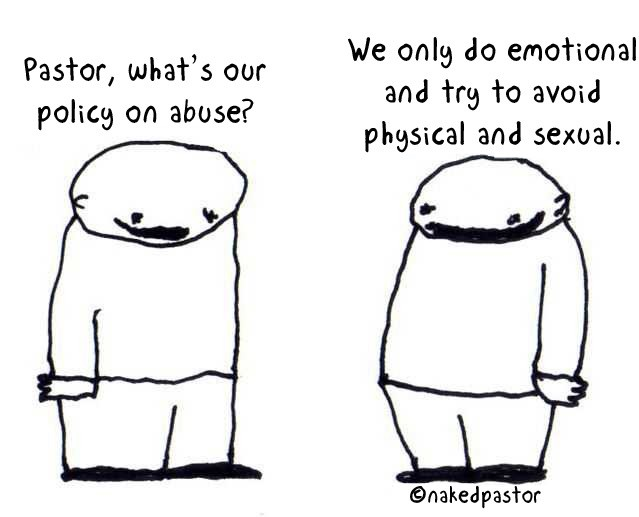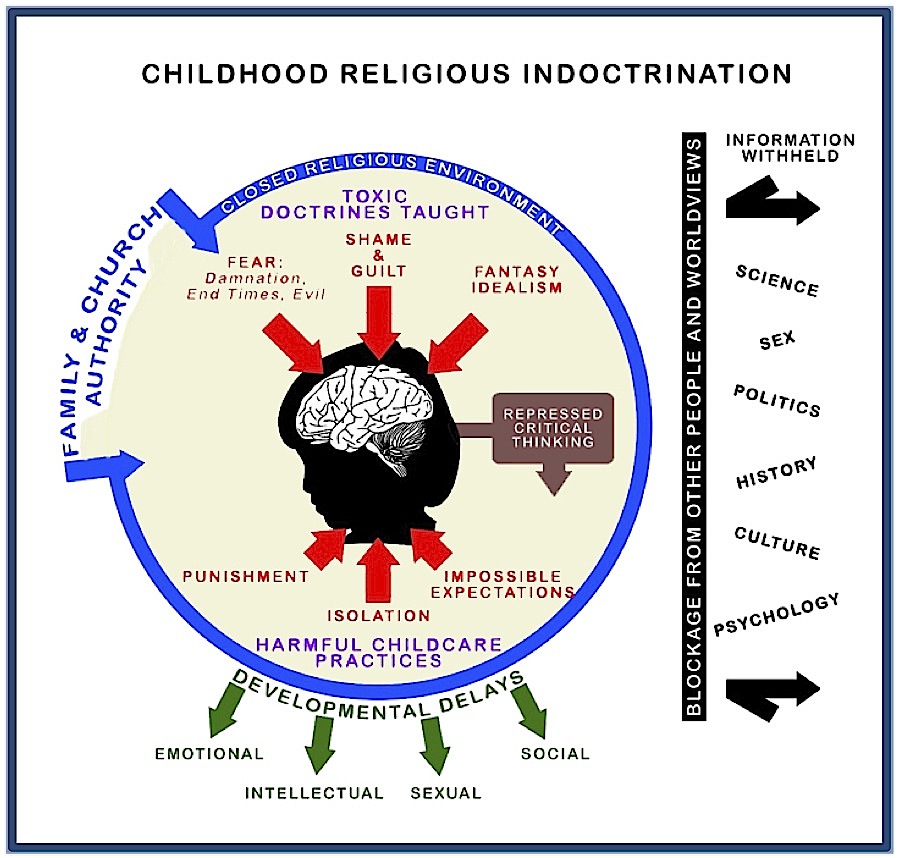« Evils of Unchecked Dogma Happiness and Religion »
Grooming and Conditioning
Central Question:
Why are grooming and conditioning patterns so prevalent in, well, every major religion
Why this is important to me:
To put it simply. The most true church should not have to resort to grooming and conditioning. People should be able to reach the best church without manipulation.
The fact that they all resort to these methods makes me feel that they are all cults. Every single religion. Cults are supposed to be the scary religious factions. The ones that we should stay away from because they can brain wash us. Yet, every major religion uses these tactics
It is not healthy behavior. It creates a culture of shaming and fear. There is a reason that grooming and conditioning get a bad name
Grooming/Conditioning Tactics Used
Dr. Darrel Ray at the Conference of Religious Trauma 2021
“Lets look at the most basic concept in religion. The notion of sin. Embedded in the concepts of sin are the roots of all religous abuse”


 https://journeyfree.org/wp-content/uploads/A-GRAPH-Childhood-Indoctrination-color.jpg
https://journeyfree.org/wp-content/uploads/A-GRAPH-Childhood-Indoctrination-color.jpg
Abuse Characteristics - Ronald Enroths
Ronald Enroth in Churches That Abuse identifies five categories used in grooming and conditioning. All of which are seen in religion:[citation needed]
- Authority and power: abuse arises when leaders of a group arrogate to themselves power and authority that lacks the dynamics of open accountability and the capacity to question or challenge decisions made by leaders. The shift entails moving from general respect for an office bearer to one where members loyally submit without any right to dissent.
- Manipulation and control: abusive groups are characterized by social dynamics where fear, guilt or threats are routinely used to produce unquestioning obedience, group conformity or stringent tests of loyalty. The leader-disciple relationship may become one in which the leader’s decisions control and usurp the disciple’s right or capacity to make choices.
- Elitism and persecution: abusive groups depict themselves as unique and have a strong organizational tendency to be separate from other bodies and institutions. The social dynamism of the group involves being independent or separate, with diminishing possibilities for internal correction or reflection, whilst outside criticism.
- Life-style and experience: abusive groups foster rigidity in behavior and belief that requires conformity to the group’s ideals.
- Dissent and discipline: abusive groups tend to suppress any kind of internal challenge to decisions made by leaders.
Abuse Characteristics - Agnes and John Lawless
Agnes and John Lawless argue in The Drift into Deception that there are eight characteristics of spiritual abuse, and some of these clearly overlap with Enroth’s criteria. They list the eight marks of spiritual abuse as comprising:[citation needed]
- Charisma and pride
- Anger and intimidation
- Greed and fraud
- Immorality
- Enslaving authoritarian structure
- Exclusivity
- Demanding loyalty and honor
- New revelation
Abusing the ‘gut feeling’
Religion abuses the ‘gut-feeling’ of their followers. This feeling is an evolutionary feeling meant for survival, fight or flight. Evolution gave us a power tool in the gut to trust an authority that is more powerful than us and cares about us. This is very valuable in helping people follow leaders that can protect them the most. It has saved billions of humans and other social animals over the years. It is a natural instinct
As seen above, dogmatic rules are built to make us feel small and dependent on authority. Once that is done, our gut points us towards following and trusting the dogma even more.
Fishing abuses a fishes natural instinct. Their gut feeling of how they eat. Dogma abuses a person’s natural instinct. Their gut feeling of trusting a leader
Thought Provoking Quotes from The God Virus
Dr. Darrel Wayne Ray (born August 24, 1950) is an American organizational psychologist. After meeting with literally 1000’s of individuals who have suffered from religious trauma he wrote the book “The Good Virus” discussing the negative components to religion. Below are a a few quotes:
“Religion does three things quite effectively: divides people, controls people, deludes people.” -Carlespie Mary Alice”
“Simply disabling specific critical thinking skills is all that is necessary for the god virus.”
“The chains men bear they forged themselves. Strike off their chains and they will weep for their lost security.” This”
“People with high dependency needs have difficulty standing up to this level of social sanction. The more dependent, the less able they are to use their native intelligence. They depend instead on the word of religious authority.”
“Nothing seems more pitiable than otherwise intelligent people gathering every Sunday to struggle ever so hard to understand something that is unintelligible.”
This is my theory based on everything above. No scientific reason
It is honestly a very ingenious cycle. It sounds like something that requires thought to create, and it does. Think of a narcist who gains power, their methods follow every one of these below steps
- Promise something that everyone wants
- Move your flock away from others that have different ideas. It makes it hard to hear any other views
- Make it impossible for someone to achieve the goal on their own (ie eternal salvation)
- Place leaders around to help them achieve said goal
- Everyone depends on those leaders more than they depend on anything else
- Those leaders control the ‘spirit’ or guy feeling of every follower
- The gut is manipulated to tell everyone to stay in the cycle
Opinion: Only Sects Using Grooming and Conditioning are Big and/or Growing
I cannot find these stats but the evidence is there. Reason shows us that the religions with massive growth follow these methods described above. It makes me wonder if they are growing because of good religion or because of grooming and conditioning
« Evils of Unchecked Dogma Happiness and Religion »
Letter Sections
- Letter
- Preface: Belief Change Bias
- Abuse And Oppression
- Bible Accuracy
- Trust In God